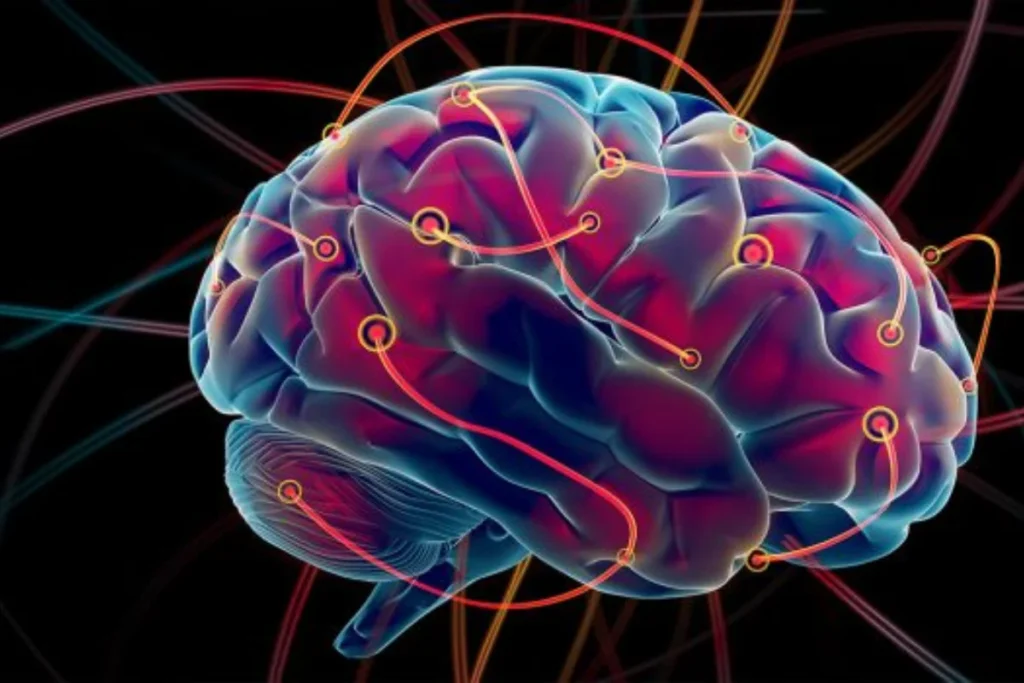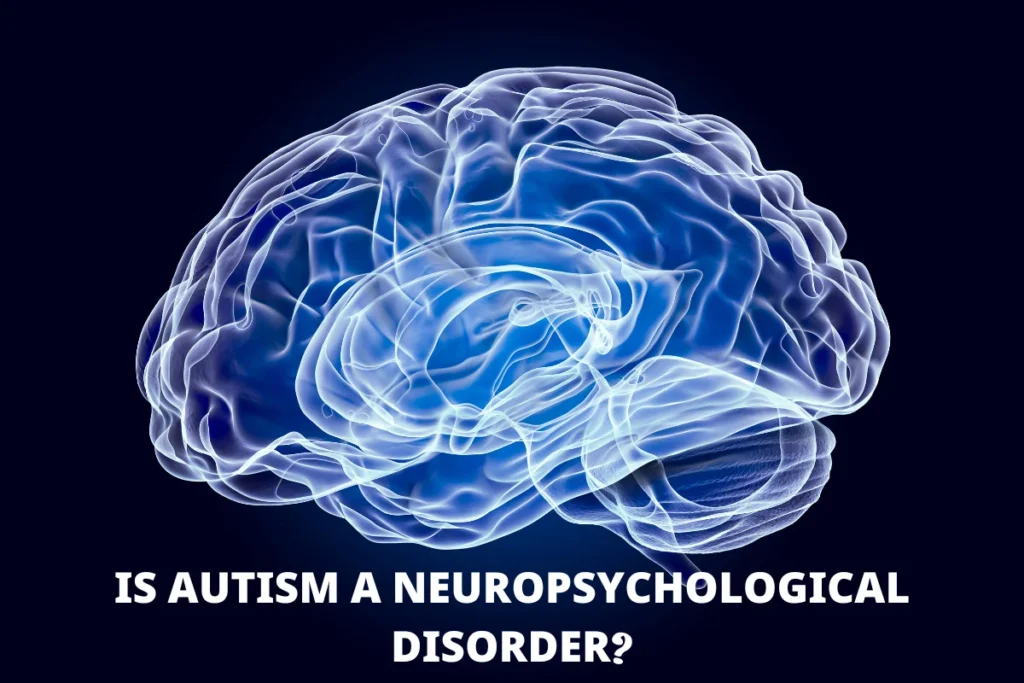Is autism a neuropsychological disorder? No, autism is not a neuropsychological disorder.
It is a neurodevelopmental disorder that affects brain development, influencing communication, behaviour, and social interaction.
While autism can involve some psychological aspects, its primary cause lies in the brain’s developmental processes, not psychological factors.
Table of Contents
What is a Neuropsychological Disorder?
A neuropsychological disorder involves changes or disturbances in the brain that affect cognitive functions, emotions, and behaviours. These disorders typically appear later in life and are linked to disruptions in brain functioning rather than brain development.

Common examples of neuropsychological disorders:
- Schizophrenia: A condition that affects thinking, emotions, and social behaviour.
- Bipolar disorder: A mood disorder characterised by extreme shifts in mood and energy.
- Depression: A mental health condition affecting mood, cognition, and behaviour.
Neuropsychological disorders typically involve changes in brain chemistry or structure that occur over time, affecting a person’s thoughts, emotions, and behaviours.
What is a Neurodevelopmental Disorder?
In contrast to neuropsychological disorders, neurodevelopmental disorders arise from differences in brain development that begin early in life. These conditions affect a person’s cognitive, social, and behavioural abilities, and they are typically noticeable in childhood.
Examples of neurodevelopmental disorders include:
- Autism
- ADHD
- Dyslexia
- Learning disabilities
Autism, like other neurodevelopmental disorders, is linked to brain development differences from a young age. For expert Autism care, check out how we can help support daily routines on our Autism Home Care Services page.
Autism vs. Neuropsychological Disorders: Key Differences
While both autism and neuropsychological disorders can involve challenges with behaviour, emotions, and cognition, there are key differences:
| Aspect | Autism | Neuropsychological Disorders |
| Onset | Present from early childhood | Develop later in life |
| Cause | Linked to early differences in brain development | Often due to brain chemistry or structural changes over time |
| Symptoms | Challenges with social communication, sensory processing, and executive function | Primarily emotional and thought-related issues (e.g., mood disorders, psychosis) |
| Treatment | Focuses on behavioural and developmental support | Treatment typically includes medication for mood or thought regulation |
Learn more about the difference between autism and learning disabilities.
Autism Brain Development And Its Impact
One of the primary reasons autism is classified as a neurodevelopmental disorder is due to the autism brain development differences seen in people with the condition.
Research using neuroimaging has shown that individuals with autism have structural and functional differences in their brains, particularly in areas that affect emotion processing, social interactions, and motor skills.
Key Brain Areas Affected in Autism:
| Brain Area | Function | Impact in Autism |
| Amygdala | Emotion regulation and social behaviour | Often overactive, leading to heightened emotional responses and social difficulties. |
| Cerebellum | Coordination, motor control, and balance | Differences in size and activity can lead to motor coordination difficulties. |
| Prefrontal Cortex | Decision-making, impulse control, and executive function | Differences can lead to struggles with planning, organisation, and impulse control. |
These differences in brain development contribute to the core characteristics of autism, such as difficulties in communication, social interaction, and sensory processing. Check out adult daycare facilities that can support adults with autism.
Cognitive Functioning in Autism
Cognitive functioning in autism varies greatly between individuals. Some individuals with autism have average or above-average intelligence, while others may have intellectual disabilities. This highlights that autism is a spectrum disorder where cognitive abilities can range widely.
- Strengths: Many individuals with autism show exceptional attention to detail, strong pattern recognition skills, and high proficiency in areas like math, art, or music.
- Challenges: Individuals with autism may struggle with tasks requiring executive functioning, such as planning, organisation, and decision-making. These difficulties can make daily life challenging, particularly in situations that require flexibility or the ability to multitask.
Research shows that autism brain development and cognitive functioning are linked, affecting how information is processed and how individuals respond to their environment.
Autism and Executive Dysfunction
One of the most common cognitive challenges for people with autism is executive dysfunction. This refers to difficulties in managing mental tasks that require planning, organisation, problem-solving, and decision-making.
These issues are often misunderstood as behavioural problems, but they stem from the brain’s executive function areas, which are affected by autism. Examples of Executive Dysfunction:
- Difficulty following multi-step instructions
- Problems with time management and organisation
- Struggles with flexibility in thinking (e.g., changes to routine cause distress)
Autism and executive dysfunction can create daily difficulties, especially in social situations and tasks that require adaptability or planning.
Psychological Aspects of Autism
While autism is primarily a neurodevelopmental disorder, it does affect psychological aspects, particularly emotional regulation and social interaction. People with autism often find it difficult to understand and express emotions, leading to struggles in both social and emotional settings.
Common Struggles in Emotional and Social Interaction:
| Struggle | How it Affects Individuals with Autism |
| Emotional Regulation | Many individuals with autism experience intense emotions but struggle to manage them, leading to meltdowns or distress. |
| Social Communication | Understanding social cues such as body language, tone of voice, and facial expressions can be difficult, leading to challenges in building relationships. |
For tips on managing autism anger in adults, visit our article on how to deal with autism anger.
Myths vs. Facts About Autism
Several myths about autism need to be addressed:
| Myth | Fact |
| Autism is caused by bad parenting | Autism is genetically influenced and has nothing to do with parenting styles. |
| Autism means intellectual disability | Autism is a spectrum disorder, meaning cognitive abilities can vary widely. |
| Autism is a psychological disorder | Autism is a neurodevelopmental disorder, not a psychological one. |
Both parents contribute to autism risk. After diagnosis, learn the next steps with our guide on what happens after autism diagnosis in the UK.
Conclusion
In conclusion, autism is a neurodevelopmental disorder driven by differences in brain development, not psychological factors.
Understanding the challenges related to cognitive function and emotional regulation is important for providing the right support. For expert care and services, visit Metro Care UK.
FAQs
Is autism part of neuropsychology?
No, autism is not a neuropsychological disorder. It is classified as a neurodevelopmental disorder, which means it involves early brain development differences.
What classification does autism fall under?
Autism is a neurodevelopmental disorder, meaning it affects brain development from a young age, influencing social, communication, and behavioural skills.
Is ADHD part of neuropsychology?
No, ADHD is a neurodevelopmental disorder, not a neuropsychological one. It affects attention, impulse control, and focus from early childhood.
Who carries the autism gene, the mother or the father?
Both parents can carry genes associated with autism, but research suggests both maternal and paternal genes contribute to the risk of autism.

